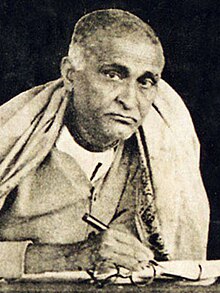Bhaktisiddhanta Sarasvati
Gaudīya Vaisnava Hindu guru and instructor (1874–1937)
Bhaktisiddhanta Sarasvati (February 6, 1874 – January 1, 1937) was a Gaudiya Vaisnava teacher in the line of disciplic succession coming from Chaitanya Mahaprabhu. Due to his fearless preaching of Vaishnavism, he was also known as Lion Guru.


Quotes edit
- We should trace the Fountain-Head, the Real Cause from Whom all these have emanated, not being content with the agnosticism that prevails more or less at present.
- Talk with Dr. Magnus Hirsch of Berlin (September 18, 1931)
- We should seek for the Fountain-head of all knowledge. If we do not do so we find ourselves poorly supplied. Our capacity for retention of knowledge also leaves us when we choose to be conversant with local, temporary, apparent truths. The symbolical deceptive Knowledge is presented when we neglect to seek the connecting thread of all knowledge. A time comes when our physical equipment parts with all its seeming possessions.
- Talk with Dr. Magnus Hirsch of Berlin (September 18, 1931)
- Of all the occupations the best one is to attend to the service of the Absolute.
- Talk with Mr. Willion Henri Jan Vandor Stok of Bavaria (December 26, 1935)
- Try to rectify yourself rather than blaspheming the nature or activities of others. That is my instruction.
- 108 Essential instructions from the book Amrta Vani, Nectar of Instructions for Immortality
- The fullest development of the idea about Godship is in Shri Krishna. He reveals Himself to His devotees of different competences in three Forms. All these three are perfect conceptions, not like the partial one of Paramatma and the incomplete one of Brahman. These three perfect conceptions are full, fuller and fullest. These three are revealed in Dwaraka, Mathura and Vrindavana. At Dwaraka Krishna's manifestation is full, at Mathura it is fuller and in Braja (including Vrindavana) it is the fullest.
- Interview with Professor Johans, Department of Philosophy, St. Xaviers College, Kolkata, West Bengal, India
- In the region of the Absolute we know there are three different energies working, one of which is His ecstatic energy by which bliss is conferred on us, and He is found to be inebriated with the ecstatic explorations. The very Absolute indulges Himself in the ecstatic mood and He is delighted; and when we find that He is delighted, we, being more or less part and parcel of the transaction, get a share as well, we being not the mind but the soul proper. When He is delighted, we necessarily get the advantage of that delightful temper of the Absolute. When He is surcharged with all beatific phases, we are also endowed with a part as per our own eligibility; as per our affinity for serving Him, we enjoy a part. Here where we are passing through a non-absolute region, our enjoyment is nothing but depriving Him of His enjoyment. We should take proper care not to carry our defective ideas there. The passionate desires of this mundane world should not be carried to the Absolute region.
External links edit
Bhaktisiddhanta Sarasvati bibliography